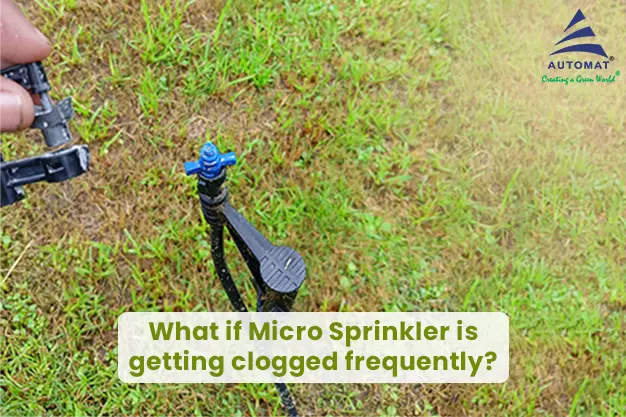Clogged drip heads and micro-sprinklers reduce or stop the flow of water from the emitter. A partially clogged drip emitter is problematic as it reduces the water discharge and supply, and it can easily go unnoticed until the drainage is completely stopped. Partial clogging of the drip line is difficult to see visually, but can be detected by measuring the water discharge rate with a sample of emitters.

If you know you have a clogging problem but you don’t know the cause, read below to diagnose the problem.
STEP 1: Check the source of water for irrigation through micro-sprinklers
Source water refers to sources of water (such as rivers, streams, lakes, reservoirs, springs, and groundwater) that provide water for Irrigation. A sand grain, rust, and other materials can block nozzles of micro and mini sprinkler which may cause unintentional plant dehydration.
Many water sources like reservoirs, rivers, and of course wastewater contain a lot of organic materials such as algae and bacteria, that have to be removed especially from drip irrigation, mist spray, and micro-sprinkler system, as small as they are. Not removing those substances can lead to dirt accumulation and colonies of harmful material within the emitters & rest of the equipment. Naturally, rust and sand grains are a safe platform for coating by organic materials and creating large chunks within the systems, causing a total blockage of water transfer.
STEP 2: Choosing the appropriate filtration system
For drip or micro-sprinklers, filtration is a basic need to avoid clogging. To keep your micro-sprinklers clean and ensure high distribution uniformity, choosing an appropriate filtration system is very important. The following points outline recommendations to consider when selecting and/or maintaining a filtration:
- Media Filter: Media filters perform the filtration of water through a thick layer of graded particles. These particles can be sand, gravel or other granular sorted materials
- Hydrocyclone Filter: Also known as “sand separators”, these filters are mainly for the removal of particles such as sand, and other solids from the irrigation water. They are ideal for situations where a pile of sand is present in water like wells, ponds etc.
- Screen Filter: These filters should be used with low sand particles load or used as a secondary filter after primary filter. They are excellent in their ability to remove hard particles like rust. But when it comes to sand, it can get stuck inside the screen and rapidly block it.
- Disc Filter: Due to their unique structure, disc filters can be used to clean low loads of organic material. It is recommended to use them after a media or hydrocyclone filter.
STEP 3. Which Size of Screen should be use to filter the particle size:
Filtration is recommended to ensure adequate water cleanliness in order to keep the systems high distribution uniformity. Pressurized irrigation systems have emitters, which are prone to clogging. For micro sprinkler systems it is recommended to use a filter with a 130 micron screen.
More specifically, if the minimum orifice size is generally not less than (0.6mm) 0.032”, in which case a filter with a 100 micron / 150 mesh screen will cope with an organic load in the water. A 250 micron / 60 mesh screen will be adequate if only inorganic material is present.
Other Disadvantages of not using filtered water in irrigation system
An irrigation system that uses subsurface water, or groundwater, must deal with different impurities to those found in water from surface sources, such as mineral substances. A high level of minerals can clog your irrigation system on two fronts.
Clumped sand from well water can physically clog your system, and chemical interactions among minerals like magnesium, hard water and fertilizers, can also increase the chances of clogging.
Unfiltered well water can wreak havoc on agricultural profitability and yield. Some of the problems that can result from using unfiltered or inadequately filtered water in your irrigation system include:
- Clogged emitters, resulting in uneven irrigation and reduced yield and/or plant damage or loss.
- Pump Failure.
- Stuck or poorly functioning valves.
- Reduced pressure in the system, which can cause myriad issues including damage to the system and/or inadequate water distribution.




